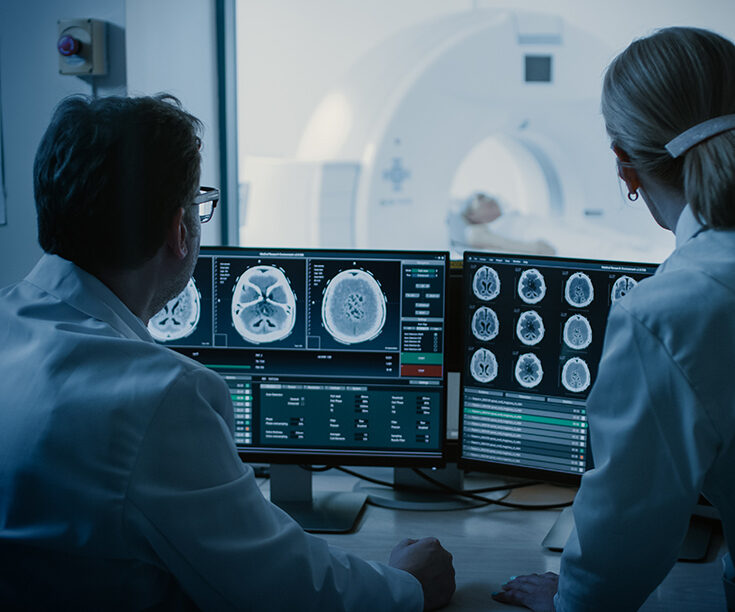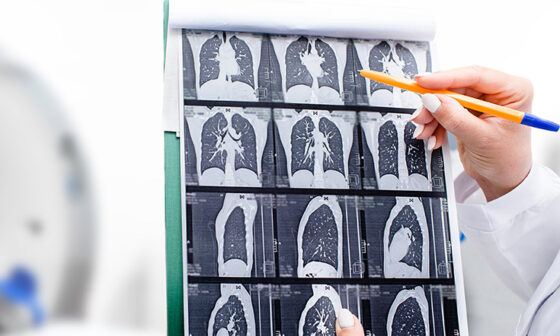

Schneck Diagnostic Imaging
Schneck Diagnostic Imaging offers comprehensive diagnostic and therapeutic testing using the latest technology. We are proud to be a Breast Center of Excellence, awarded by the American College of Radiology. Our radiologists are board certified with additional training in cardiac and breast specializations.

Schneck Diagnostic Imaging Services
We offer comprehensive diagnostic and therapeutic testing using the latest technology. We are proud to be a Breast Center of Excellence, awarded by the American College of Radiology.
Our services include:
- Traditional X-rays
- 3D Mammography
- Ultrasound Scanning
- Bone Density Scans
- CT Scanning
- Magnetic Resonance Imaging (MRI)
- Nuclear Medicine
- PET Scanning (mobile services)
- Specialty Procedures
Our all-digital imaging system means images are ready sooner for your physician to review within our Electronic Medical Record (EMR).
The Diagnostic Imaging department is prepared to meet the needs of all patients, with a staff that is encouraged to continue professional and personal growth, and continually strive to offer the best service and technology in our region. Our radiologists are board certified with additional training in cardiac and breast specializations.
"Lisa did an excellent job. She even went out of her way to update my husband in the waiting room I was doing fine, but there would be a longer wait due to further testing. He told me he appreciated the update so he didn't become concerned!"
~ Peggy, Schneck Diagnostic Imaging Patient
Schneck Medical Center is excited to announce the installation of new scanning technology that combines the latest advancements in magnetic resonance imaging (MRI) with patient comfort features.
The new GE MRI scanner system is the most sophisticated 1.5T MRI in the area. The MRI features a larger and more open tunnel that patients lie in to receive their MRI scan. It also includes Caring Suite technology. Caring Suite creates a unique environment that is customizable to the patient and uses images, sounds and lights to create a more relaxing and soothing atmosphere. “We are excited to bring this state-of-the-art technology to our community, who will benefit significantly from its enhanced imaging capabilities and patient-friendly features,” says Rita Hollen, Director of Diagnostic Imaging at Schneck. “The Caring Suite technology, which is the first of its kind in the area and one of only a few in the world, offers a more comfortable, less clinical environment for patients needing an MRI.”
Magnetic Resonance Imaging (MRI) Scans
MRI scanning uses magnetic and radio frequency waves to generate highly detailed images of the body. Unlike CTs and X-rays, there is no radiation involved with an MRI. An MRI can help diagnose ailments of the brain, sports injuries, pelvic problems, prostate problems, ear, nose and throat conditions, and musculoskeletal injuries.
Due to the magnetic waves, some patients are unable to have an MRI scan. If you have a pacemaker, cochlear implants, a metallic foreign object in your eye, recent surgery, or are pregnant, an MRI may not be a safe imaging option. Further investigation will be completed to determine if an MRI is the best option for you.
What to expect
Before you enter the MRI room, our board-certified technologists will ask you to remove any metal from your body. Phones, keys, hearing aids, and jewelry are just a few of the common objects containing metal. You will also be asked about any metal implants or other metallic objects that you may have within your body. This is to keep you safe during your procedure.
After explaining the exam to you, you will be asked to lie down on the scan table. The procedure may be loud, you will be given headphones or ear plugs. The table will position you in the scanner to best access the area to be imaged. It is important that you stay very still during the exam.
You will be in full view of the tech during your entire procedure. They will be in an adjoining room during the scan. The MRI room is equipped with a two way intercom so you are in communication with the tech at all times.
Once the images are obtained, the radiologist will be notified. Radiology reports will be provided to your attending provider - whether in the Emergency Room or a doctor's office.
If you have any questions about MRI scans, please contact the Schneck Diagnostic Imaging Department by calling (812) 522-0144 or email us.
CT Imaging
A CT Scanner is a device that builds a 3D cross-section image of a particular part or area of the body and is displayed on the technologist's screen. A traditional X-ray uses a single radiation beam to capture a flat image. The CT scanner uses an x-ray detector, but it emits a series of beams as it moves in a circle around your body. This creates a very detailed image, including density of the tissues inside an organ.
In some cases, a contrast dye is used to highlight a specific part of the body or an organ. Typically a contrast substance is administered by ingestion, IV fluids, or enema placement. The contrast appears white as it travels through the desired location. Your doctor or radiologist will advise you in advance if a test including contrast is needed.
What to Expect
A board-certified technologist will perform your exam. After explaining the exam to you, you will be asked to lie down on the scan table. The table will move and you will be positioned in the scanner to best access the area to be imaged. It is common for the table to move as the scanning is taking place. For this reason it is important that you stay very still during the exam.
You will be in full view of the tech during your entire procedure. They will be in an adjoining room during the scan. The CT room is equipped with a two way intercom so you are in communication with the tech at all times.
Once the images are obtained, the radiologist will be notified. Radiology reports will be provided to your attending provider - whether in the Emergency Room or a doctor's office.
PET / CT Imaging
Positron Emission Tomography (PET) scan is an imaging test that helps accurately diagnose, stage and treat cancer. Results help determine:
- Size and location of the growth
- Cancer location and if it is spreading
- Best form of treatment
- Therapy effectiveness
- Cancer recurrence
Ultrasound scans, also known as sonograms or ultrasonography, is a type of imaging that uses high frequency sound waves used by the computer to create images of particular areas inside the body. Ultrasounds are painless and use no radiation.
Schneck offers vascular sonography for the Vein Center as well as abdominal and gynecological imaging in the Diagnostic Imaging and Women's Diagnostic Imaging Center. Ultrasounds are typically used the diagnose problems of the liver, heart, kidney or abdomen. They are also useful for assisting surgeons and radiologists during specialty procedures.
Once the images are obtained, the radiologist will be notified. Radiology reports will be provided to your attending provider - whether in the Emergency Room or a doctor's office.
If you have any questions about ultrasound scans, please contact the Schneck Diagnostic Imaging Department by calling (812) 522-0144 or email us.
Nuclear medicine tests use a radioactive substance and a special camera to takes pictures of a specific area of your body. While imaging tests such as X-rays can show what the structures inside your body look like, nuclear medicine scans produce 3-D images of tissue and organs that show your body's function.
There are different radioactive substances that are available to the technologist. Each test uses specific substances depending upon the area(s) of the body to be tested. Once the test is complete the substance leaves the body through urine or stool.
Once the images are obtained, the radiologist will be notified. Radiology reports will be provided to your attending provider - whether in the Emergency Room or a doctor's office.
If you have any questions about Nuclear Medicine, please contact the Schneck Diagnostic Imaging Department by calling (812) 522-0144 or email us.
Preventative Screenings
Schneck Diagnostic Imaging offers a variety of preventative screenings. Check out some of our featured screenings below or click to see the full list. All are available without a doctor referral.

Calcium Scoring
Schneck offers a low-cost test to determine if you are at risk for a heart attack in the next five years. The calcium scoring CT scan checks for Coronary Artery Disease (CAD).

Lung Cancer Screening
Schneck offers lung cancer screenings. It's an affordable convenient way to help catch lung cancer early, and make it far more treatable.

Breast Health
The team at Schneck provides advanced Breast Health care, close to home. From screenings to treatments, and easy to schedule 3D Mammograms, patients are given a personalized plan to give them the best outcome possible.

Vascular Screening $69
Three simple tests that can save your life. All for one low price -$69.
Radiologists at Schneck
Advanced Diagnostic Experts

Daniel J. Daunhauer, MD
Radiology View Info »
Michael J. Malnofski, MD
Radiology View Info »
LeAnn Stidham, MD
Radiology View Info »
Nathan M. Strabala, MD
Radiology View Info »Diagnostic Imaging
Schneck Medical Center
411 W. Tipton St.
(park in the surface lot next to the main entrance)
Seymour, IN 47274
Call for Appointment
Ph. 800-234-9222Stay Informed. Get Involved.
Explore new posts and learn about upcoming events in the Schneck community.

Commit to Yourself: Prioritize Breast Health.
Read Blog »
schneckWELL Community Health Fair
Event Details »
Schneck Medical Center Unveils Advanced MRI Technology
Read News »
Prenatal Class - April 23, 2024
Event Details »
Solar Eclipse April 8, 2024
Read Blog »
Breastfeeding Support Group
Event Details »
Walk-in for Quality Orthopedic Care
Read Blog »
Bariatric Support Group - May 13, 2024
Event Details »
Schneck CEO Named Rural Hospital CEO to Know
Read News »
